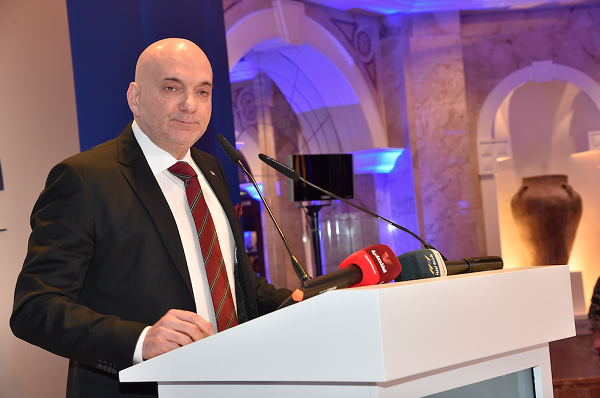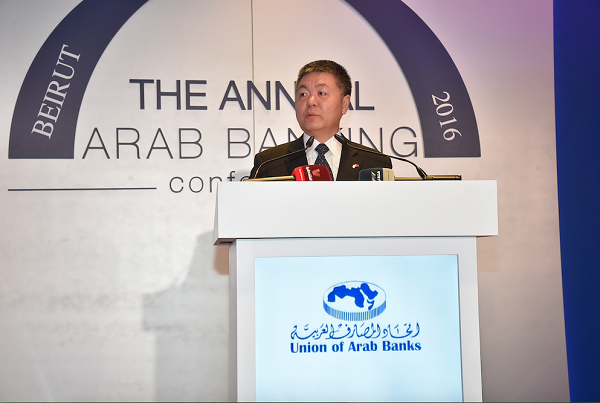The Union of Arab Banks concluded the 21st session of the annual Arab Banking Conference titled “Lobbying for Better Arab – International Banking Cooperation”, on Friday November 25, 2016 at Phoenicia Hotel, Beirut.
The conference was held the presence of His Excellency Mr. Amr Moussa, Former Secretary General of the League of Arab States and Former Minister for Foreign Affairs of the Arab Republic of Egypt, His Excellency Sheikh Mohamad El Jarrah Al Sabah, Chairman of the Union of Arab Banks, Mr. Wissam Fattouh, the Secretary General of the Union of Arab Banks, His Excellency Dr. Alain Hakim, Minister of Economy and Trade, His Excellency Dr. Ghada Alwali, the Minister of Social Solidarity of Arab Republic of Egypt, His Excellency Mr. Wang Kejian, the Chinese Ambassador to Lebanon and a number of the leading banks in the region along with international and Arab ambassadors and diplomats.
The second and last day of the conference was launched by a speech pronounced by His Excellency Dr. Alain Hakim, the Minister of Economy and Trade, where he stressed on “the importance of the cooperation between all Arab countries, given the role it plays in liberating the unexploited capacities of the Arab economy. The Arab banking conglomerate gives power to Arab banks especially that it limits their exposure to international financial crises and it enhances their potential on that level.” He then listed the benefits of establishing a banking conglomerate like ameliorating the bilateral trade, enhancing investments and ameliorating the competitiveness in the region.
As for His Excellency Dr. Ghada Alwali, the Minister of Social Solidarity of Arab Republic of Egypt, she thanked the Union of Arab Banks for the choice of the subject of this year’s conference, saying that “among the most difficult regional and international circumstances since World War II, the Arab banking sector proved that it is more solid and powerful that a great number of institutions.” She then suggested that Arab banking institutions work on “achieving financial inclusion for all parts of our community and on building a regional conglomerate surpassing all political disputes or regional feuds to focus on economic interests.

If these Arab banks succeed in uniting to serve all Arab affairs and in helping Arab economies and communities rise worldwide, they become eligible for a conglomerate aiming at fulfilling its vision internationally so that its voice gets heard when drafting legislations and policies ruling the International Finance System.”
From his end, His Excellency Mr. Wang Kejian, the Chinese Ambassador to Lebanon said in his speech that “China has always paid attention and took care of the traditional friendship and strategic cooperation with Arab countries and it is keen on enriching and deepening the global and multi-level cooperation, especially on a financial level, between China and the Arab World.” He also stressed that “China supports the Chinese financial institutions and their Arab competitors eligible to have branches on its grounds. China also calls to enhance the monetary cooperation between both parties’ Central Banks.” At the end, he invited all parties to continue developing the Chinese-Arab financial cooperation in order to get concrete results based on mutual interest and opening new horizons for the Chinese-Arab relations.
Afterwards, the “Chinese Arab Banking Dialogue” was launched before the second day continued with two sessions titled “The Role of the Arab Banking Sector in Financing Various Economic Sectors” and “Impact of International Regulations on the Funding Policies of Arab Banks”. The last day of the conference concluded with the following closing remarks aiming easing the process of establishing big banking conglomerates and an Arab lobby to be more present on the international economic and banking map:
1. Inviting Arab banks to cooperate and focus their capacities and investments on our Arab World, along with adopting a global structure that guarantees interaction and cooperation in the economic, human and humanitarian growth process.
2. Establishing an Arab banking conglomerate to fight international pressure, enhancing the Arab economic action and activating the role of Arab banks in formulating financial, monetary and economic decisions issued by the international institutions which guarantees a solid presence on the regional and international banking platform and a secured Arab banking system.
3. Setting strategic partnerships between Arab banks and between Arab and international banks, creating huge groups to encourage cross-border investment and to attract, manage and employ financial resources in the Arab economies along with working on guiding them towards investing in the real economy.
4. Inviting specific authorities and Arab economic and financial decision makers to set the grounds to boost the cooperation between Arab economies, the emancipation of Arab markets and the adoption of policies that support growth and development.
5. Put more efforts on the Arab regulatory authorities in order to set a unified plan aiming at fighting the crimes of money laundering, financing terrorism and tax evasion.
6. The necessity to enhance the relations between Arab banks and correspondent banks, to deepen and fulfill all actions to fight money laundering and financing terrorism. The necessity to send messages reassuring the world that the Arab banking system is safe and efficient, especially in the field of relations with correspondent banks, and that it follows all procedures and execute all international criteria in the fields of money laundering, financing terrorism and tax evasion.
7. Inviting Arab banks to allocate a share of their external investments to support projects related to reconstruction and to help in resolving war issues in the Arab World.
8. The necessity to enhance financial inclusion in the Arab region, especially in financing small and average projects, for the direct effect it has on fighting unemployment, limiting poverty and illiteracy and fighting terrorism.














